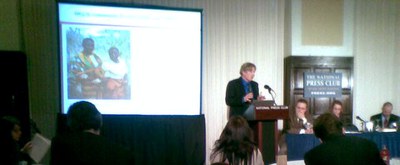FCMC Shares New Insights on Community Forestry and REDD+ at Community-Based Natural Resource Management Workshop

On January 16 and 17, 2013, FCMC participated in the USAID Community-Based Natural Resource Management (CBNRM) workshop in Washington, D.C. FCMC shared preliminary results of the “Lessons Learned from Community Forestry and Their Relevance for REDD+” studies at the high-profile event targeted at international development professionals.
FCMC distributed relevant materials and engaged with colleagues at the workshop’s exhibition hall. On the second day of the workshop, Roy Hagen, the study team leader, gave a presentation highlighting lessons of relevance to REDD+ during the panel discussion on “Key Issues in Designing, Implementing and Evaluating CBNRM Programs with Multiple Development Impacts."
FCMC sought to inform experts from a range of development fields, including global climate change, environmental conservation, food security and economic development, on key community forestry lessons from recent FCMC studies in Latin America, Africa and Asia. The study focused on six elements of community forestry of particular relevance to REDD+: community empowerment and tenure, governance and stakeholder engagement, benefits and incentives, capacity building, scaling up, and long-term sustainability. The presentation also highlighted regional differences in community forestry found in the review.
In the spring of 2013, FCMC plans to hold an experts’ workshop to present these issues in more depth. The team hopes that with further discussion and consideration of community forestry experiences, the foundation for effective REDD+ implementation will be strengthened.

